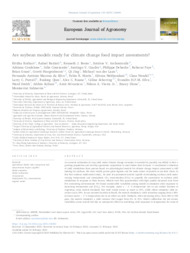Are soybean models ready for climate change food impact assessments?
Are soybean models ready for climate change food impact assessments?
Author(s): KOTHARI, K.; BATTISTI, R.; BOOTE, K. J.; ARCHONTOULIS, S. V.; CONFALONE, A.; CONSTANTIN, J.; CUADRA, S. V.; DEBAEKE, P.; FAYE, B.; GRANT, B.; HOOGENBOOM, G.; JING, Q.; VAN DER LAAN, M.; SILVA, F. A. M. da; MARIN, F. R.; NEHBANDANI, A.; NENDEL, C.; PURCELL, L. C.; QIAN, B.; RUANE, A. C.; SCHOVING, C.; SILVA, E. H. F. M.; SMITH, W.; SOLTANI, A.; SRIVASTAVA, A.; VIEIRA JÚNIOR, N. A.; SLONE, S.; SALMERÓN, M.
Summary: Abstract. An accurate estimation of crop yield under climate change scenarios is essential to quantify our ability to feed a growing population and develop agronomic adaptations to meet future food demand. A coordinated evaluation of yield simulations from process-based eco-physiological models for climate change impact assessment is still missing for soybean, the most widely grown grain legume and the main source of protein in our food chain. In this first soybean multi-model study, we used ten prominent models capable of simulating soybean yield under varying temperature and atmospheric CO2 concentration [CO2] to quantify the uncertainty in soybean yield simulations in response to these factors. Models were first parametrized with high quality measured data from five contrasting environments. We found considerable variability among models in simulated yield responses to increasing temperature and [CO2]. For example, under a + 3 °C temperature rise in our coolest location in Argentina, some models simulated that yield would reduce as much as 24%, while others simulated yield increases up to 29%. In our warmest location in Brazil, the models simulated a yield reduction ranging from a 38% decrease under + 3 °C temperature rise to no effect on yield. Similarly, when increasing [CO2] from 360 to 540 ppm, the models simulated a yield increase that ranged from 6% to 31%. Model calibration did not reduce variability across models but had an unexpected effect on modifying yield responses to temperature for some of the models. The high uncertainty in model responses indicates the limited applicability of individual models for climate change food projections. However, the ensemble mean of simulations across models was an effective tool to reduce the high uncertainty in soybean yield simulations associated with individual models and their parametrization. Ensemble, ensemble mean yield responses to temperature and [CO2] were similar to those reported from the literature. Our study is the first demonstration of the benefits achieved from using an ensemble of grain legume models for climate change food projections, and highlights that further soybean model development with experiments under elevated [CO2] and temperature is needed to reduce the uncertainty from the individual models.
Publication year: 2022
Types of publication: Journal article
Observation
Some of Embrapa's publications are published as ePub files. To read them, use or download one of the following free software options to your computer or mobile device. Android: Google Play Books; IOS: iBooks; Windows and Linux: Calibre.
Access other publications
Access the Agricultural Research Database (BDPA) to consult Embrapa's full library collection and records.
Visit Embrapa Bookstore to purchase books and other publications sold by Embrapa.

